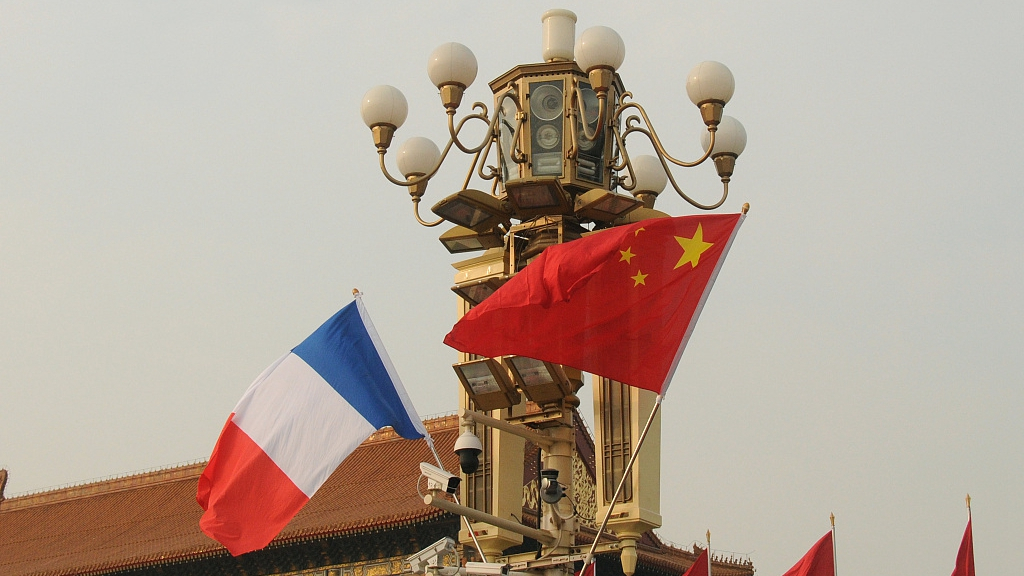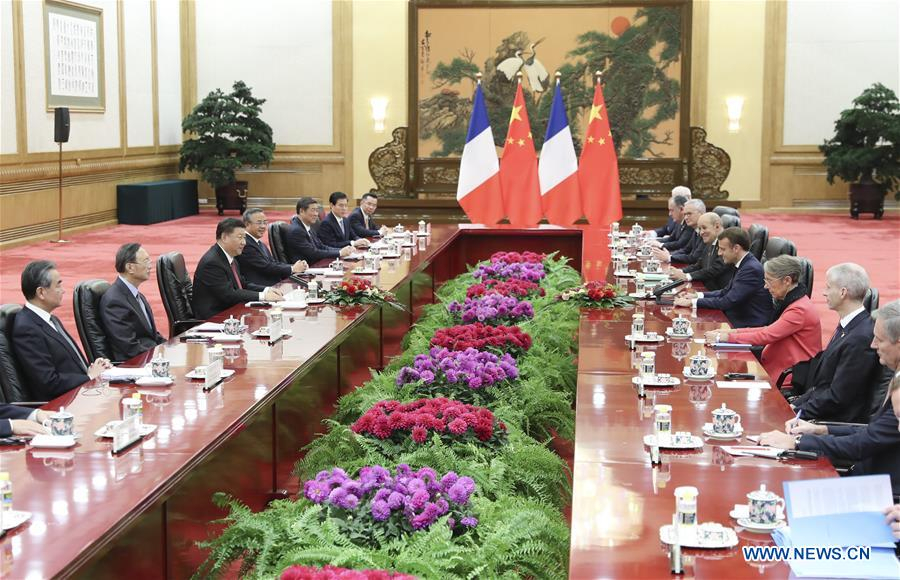
Editor's note: Sun Hong is an associate research fellow at the Institute of African Studies of the China Institutes of Contemporary International Relations. The article reflects the author's views, and not necessarily those of CGTN.
Macron's second visit to China has highlighted bilateral willingness to cooperate more on African affairs. Future peacekeeping sharing and joint projects in African market were announced along with other initiatives. As two major stakeholders in Africa, China and France could contribute more for Africa's security and development.
This would firstly boost global awareness regarding African affairs. Compared to other conflict-afflicted or underdeveloped areas, the magnitude of security and development conundrums faced by Africa has not been given enough attention, neither in media coverage nor the agenda of major international gatherings.
The critical reality is that a dozen of African countries are still grappling with limited resources to deal with all sorts of non-traditional security threats, terrorism, piracy or epidemic diseases, to name a few.
Both France and China have considerable interests in Africa, including expatriates or economic activities. As permanent members of United Nations Security Council, the two countries should and could speak up for and act alongside African countries.
For example, China and France could initiate more open discussions and debates on African security issues inside the UN Security Council. The current Ebola crisis in the Democratic Republic of the Congo, rising terrorist activities in Burkina Faso, lifting sanction on Zimbabwe, etc., should be given more attention.
At the request of African countries, the extending of certain peacekeeping mission mandate, adjusting mission size and budget scale also requires aligned efforts from the two, especially at a time when the United States, the largest financial contributor to U.N. peacekeeping, tries to weaken the role of U.N. in world peace by cutting its support.
Exchanges between Chinese peacekeepers and French troops on the ground could be strengthened as well. Currently, French troops are combating terrorists in Mali alongside UN Peacekeeping mission to which China has sent more than 400 troops.
Chinese peacekeepers are more often than not portrayed by media as reticent to interact with Western militaries due to language barriers and cultural gap. However, this is the best occasion for the two militaries to build mutual trust based on daily interaction and coordinating counter-terrorism efforts on the ground.

Chinese President Xi Jinping holds talks with French President Emmanuel Macron at the Great Hall of the People in Beijing, November 6, 2019. /Xinhua Photo
Chinese President Xi Jinping holds talks with French President Emmanuel Macron at the Great Hall of the People in Beijing, November 6, 2019. /Xinhua Photo
Counter-piracy could be another potential area of cooperation. The past several years have seen piracy activities and armed robbery rising in the Gulf of Guinea, making it the most dangerous waters globally.
The latest statistics from the International Maritime Bureau show that this region accounts for 86 percent of hostage-taking and 82 percent of kidnapping on global seas in the third quarter of 2019. China and the European Union have been carrying out successful joint escort missions in the Gulf of Aden.
The nearly zero piracy report in the Red Sea in recent years serves as the most persuading proof of this cooperation. It is worth considering replicating this model in the Gulf of Guinea.
Furthermore, France is already deeply involved in regional mechanisms. For example, The G7 Friends of the Gulf of Guinea Group, aims to restore peace and prosperity in this area.
Considering the good relations China has maintained with regional countries and its increasing footprint in the West Africa, China could contribute in a positive way to this initiative once it gets involved.
Development is another area of common interest. Africa has always been a priority area for French Official Development Assistance. In 2016, one-third of French bilateral and multilateral assistance went to Sub-Saharan Africa's education, climate mitigation, and health sectors. Chinese aid to Africa is different in its approach, as it focuses on improving infrastructure conditions to create a better investment environment for African countries.
China and France could combine their respective advantages in this area and provide the best offer to the local population. For example, hospitals built with Chinese aid in Niger or Ethiopia, could shelter medical workers from both countries.
One important thing to keep in mind for China and France to cooperate in Africa is to respect the ownership of local countries. As Chinese Foreign Minister Wang Yi once said during the 2015 Lanting Forum, the principle of "Africa agrees, Africa needs and Africa leads" should always be observed to carry out any joint projects on the continent.
The world is witnessing unprecedented challenges and multilateralism is undergoing multiple blows. As the continent with the most developing countries, Africa will bear the brunt of the external impact.
China and France choosing to work together for the benefits of Africa demonstrates the strong willingness of the two countries to defend the current multilateral system from any irresponsible and unilateral actions.
It should be noted that cooperation will always remain the best choice for any stakeholders setting foot on Africa considering its vast land area.
(If you want to contribute and have specific expertise, please contact us at opinions@cgtn.com.)